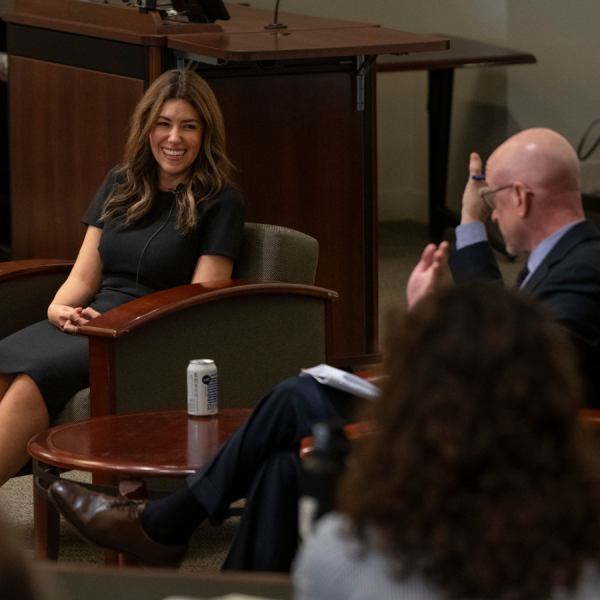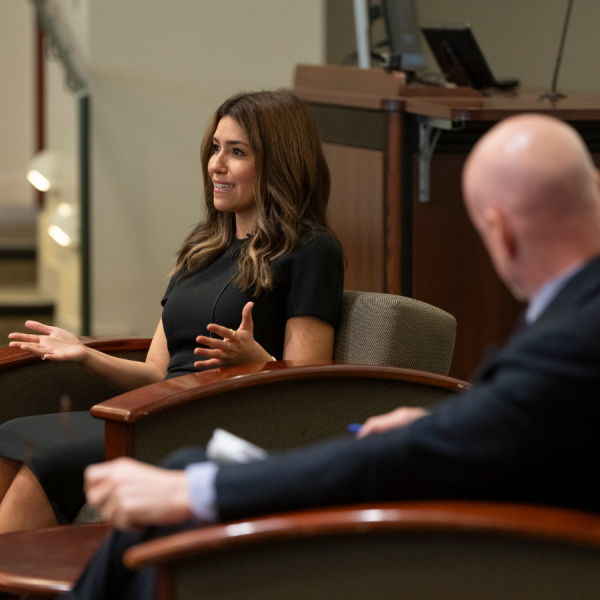Earlier this month, The Entertainment and Sports Law Society, the Office of Career Services, and the Branstetter Litigation and Dispute Resolution Program hosted Camille Vasquez, one of the lead attorneys in the 2022 Johnny Depp v. Amber Heard trial that captured the attention of Hollywood and the world. A partner in Brown Rudnick’s Litigation & Arbitration Practice Group and co-chair of the firm’s Brand & Reputation Management group, Vasquez garnered national attention, praise, and honors through her work on Depp v. Heard. She discussed the influence her upbringing had on her professional career and the ins and outs of the Depp v. Heard trial.
 Vasquez credits her success to her immigrant parents, who did not offer her much choice in the way of profession. “Doctor or lawyer, pick one,” she recalled being told growing up. Vasquez wanted to be an advocate, and her parents believed in her and made her feel like she could accomplish anything she put her mind to. She graduated magna cum laude from the University of Southern California before earning her J.D. from Southwestern Law School and entering the legal field.
Vasquez credits her success to her immigrant parents, who did not offer her much choice in the way of profession. “Doctor or lawyer, pick one,” she recalled being told growing up. Vasquez wanted to be an advocate, and her parents believed in her and made her feel like she could accomplish anything she put her mind to. She graduated magna cum laude from the University of Southern California before earning her J.D. from Southwestern Law School and entering the legal field.
In her work on high-profile cases, she noted that the public assumes it knows who the celebrity clients really are, so it is her job to rewrite the narrative surrounding them. For Johnny Depp, the case was never about money damages, but his reputation – “all anyone has is their name, so my goal was to give Johnny’s back to him,” she said.
Depp was the plaintiff in another defamation case involving the UK newspaper, The Sun, two years before Depp vs. Heard. Depp lost that case, which Vasquez attributed to differences in UK and US law and the courtroom structure. “In the UK, there is only cross-examination, so you lose the ability to build your client’s story that you would normally have in direct examination,” she noted. The loss in court caused Depp to lose corporate sponsorships and public support, but the decision left him undeterred. “He knew the truth and had one goal in mind: vindicate his name,” she said.
Extensive preparation went into the American retrial– thousands of hours and eighty depositions spanning more than 9 months. Vasquez built a young team that she felt could fully grasp the implications of domestic abuse allegations, which Heard offered in a Washington Post op-ed. Vasquez emphasized the significance of the public’s interest in the case. “Winning the court of public opinion is as important as ever for clients because these days everyone is a journalist,” she said. “All it takes is one tweet or post to change the tide of a case.”
In a case with many layers and intricacies, Vasquez focused exclusively on the big accusations rather than addressing every detail , something that they failed to do in the UK trial. “If someone is willing to lie about something as serious and horrific as sexual assault,” she reasoned, “I could convince the jury that they were lying about everything else too.”
Vasquez and her partner, Ben Chew, decided early on that she would go after Heard while he defended Depp; a man calling Heard a liar about sexual abuse might elicit public backlash. “You can’t defend and also attack, that would be too defensive, so there had to be two people doing these roles,” she explained. Heard and Vasquez vied for influence – Heard wanted to get the jury to sympathize with her, but Vasquez knew that if that happened, she’d fail at being Johnny’s voice. By the end of the trial, Vasquez had succeeded in her role as an advocate.